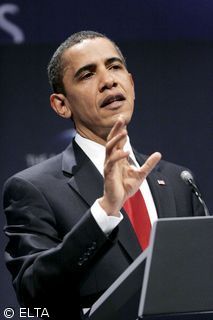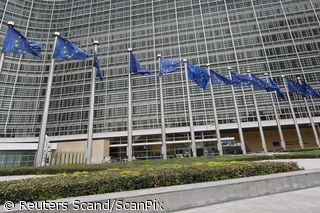Industrial group Siemens AG won't move 2,000 phone assembly jobs from northwest Germany to lower-wage Hungary
Published:
26 June 2004 y., Saturday
Industrial group Siemens AG won't move 2,000 phone assembly jobs from northwest Germany to lower-wage Hungary, now that workers have agreed to lengthen their work week to 40 hours from 35 for no more money, the company said Thursday.
The agreement with the IG Metall union specifies that workers at the Bocholt and Kamp-Lintfort facilities must work an average of 1,760 hours a year measured over a two-year period. Excluding vacation and holidays, that amounts to an average 40-hour week, and permits the company to gear up when there's more work and have people work less when it's slow.
"The solution for Kamp-Lintfort and Bocholt is a triumph of reason," said Siemens CEO Heinrich von Pierer, who has said the facilities must cut costs or see jobs move east. "Our employee representatives, IG Metall and our company management have show that there are realistic ways to counteract job cuts in Germany."
The agreement, struck between the industrial employers' association and IG Metall, takes effect July 1 and guarantees the jobs of the covered workers at the two plants - more than 4,000 in all - who assemble mobile and cordless phones.
Šaltinis:
thestate.com
Copying, publishing, announcing any information from the News.lt portal without written permission of News.lt editorial office is prohibited.
The most popular articles
 Standard & Poor's (S&P) affirmed Lithuania's long-term investment grade sovereign foreign currency BBB credit rating and removed it from a CreditWatch negative position, citing government commitments to address deteriorating public finances.
more »
Standard & Poor's (S&P) affirmed Lithuania's long-term investment grade sovereign foreign currency BBB credit rating and removed it from a CreditWatch negative position, citing government commitments to address deteriorating public finances.
more »
 The EBRD-EIB Multilateral Carbon Credit Fund (MCCF) and Azerenerji Joint Stock Company are collaborating in order to promote energy-efficient power generation in Azerbaijan.
more »
The EBRD-EIB Multilateral Carbon Credit Fund (MCCF) and Azerenerji Joint Stock Company are collaborating in order to promote energy-efficient power generation in Azerbaijan.
more »
 U.S. President Barack Obama, meeting with the leaders of Mexico and Canada, called on all three nations hit by the global recession to avoid resorting to protectionism.
more »
U.S. President Barack Obama, meeting with the leaders of Mexico and Canada, called on all three nations hit by the global recession to avoid resorting to protectionism.
more »
 A 10-year $75 million EBRD loan will finance the construction of a combined heat and power plant in the east Siberian city of Krasnoyarsk which is expected to improve energy efficiency and cut pollution by 14 percent thanks to the use of more environmentally-friendly technologies.
more »
A 10-year $75 million EBRD loan will finance the construction of a combined heat and power plant in the east Siberian city of Krasnoyarsk which is expected to improve energy efficiency and cut pollution by 14 percent thanks to the use of more environmentally-friendly technologies.
more »
 The Directorate-General for Competition has issued a review of the aid schemes introduced by Member States and approved by the Commission during the financial crisis.
more »
The Directorate-General for Competition has issued a review of the aid schemes introduced by Member States and approved by the Commission during the financial crisis.
more »
 Rescue planes from New Zealand have been taking part in a massive search for passengers after a ferry sank off the coast of Tonga. At least 27 people are missing.
more »
Rescue planes from New Zealand have been taking part in a massive search for passengers after a ferry sank off the coast of Tonga. At least 27 people are missing.
more »
 Courtney Adams has always loved cooking. As a kid she baked brownies for her friends and in college her apartment was the place to go to for a home-cooked meal. But she never thought she'd cook for a living.
more »
Courtney Adams has always loved cooking. As a kid she baked brownies for her friends and in college her apartment was the place to go to for a home-cooked meal. But she never thought she'd cook for a living.
more »
 The European Commission has authorised, under EC Treaty state aid rules, a scheme offering reduced-interest loans to businesses investing in the production of environmentally friendly products, as part of the German package to tackle the current economic crisis.
more »
The European Commission has authorised, under EC Treaty state aid rules, a scheme offering reduced-interest loans to businesses investing in the production of environmentally friendly products, as part of the German package to tackle the current economic crisis.
more »
 Ramūnas Bičiulaitis, former board member and financial director of AB LEO LT, starts working as head of the Finance Department of Danske Bankas.
more »
Ramūnas Bičiulaitis, former board member and financial director of AB LEO LT, starts working as head of the Finance Department of Danske Bankas.
more »
 The EBRD has kept up a rapid pace in the syndicated loans market, defying difficult market conditions and pulling together nine deals so far this year, worth a total €1.2 billion.
more »
The EBRD has kept up a rapid pace in the syndicated loans market, defying difficult market conditions and pulling together nine deals so far this year, worth a total €1.2 billion.
more »